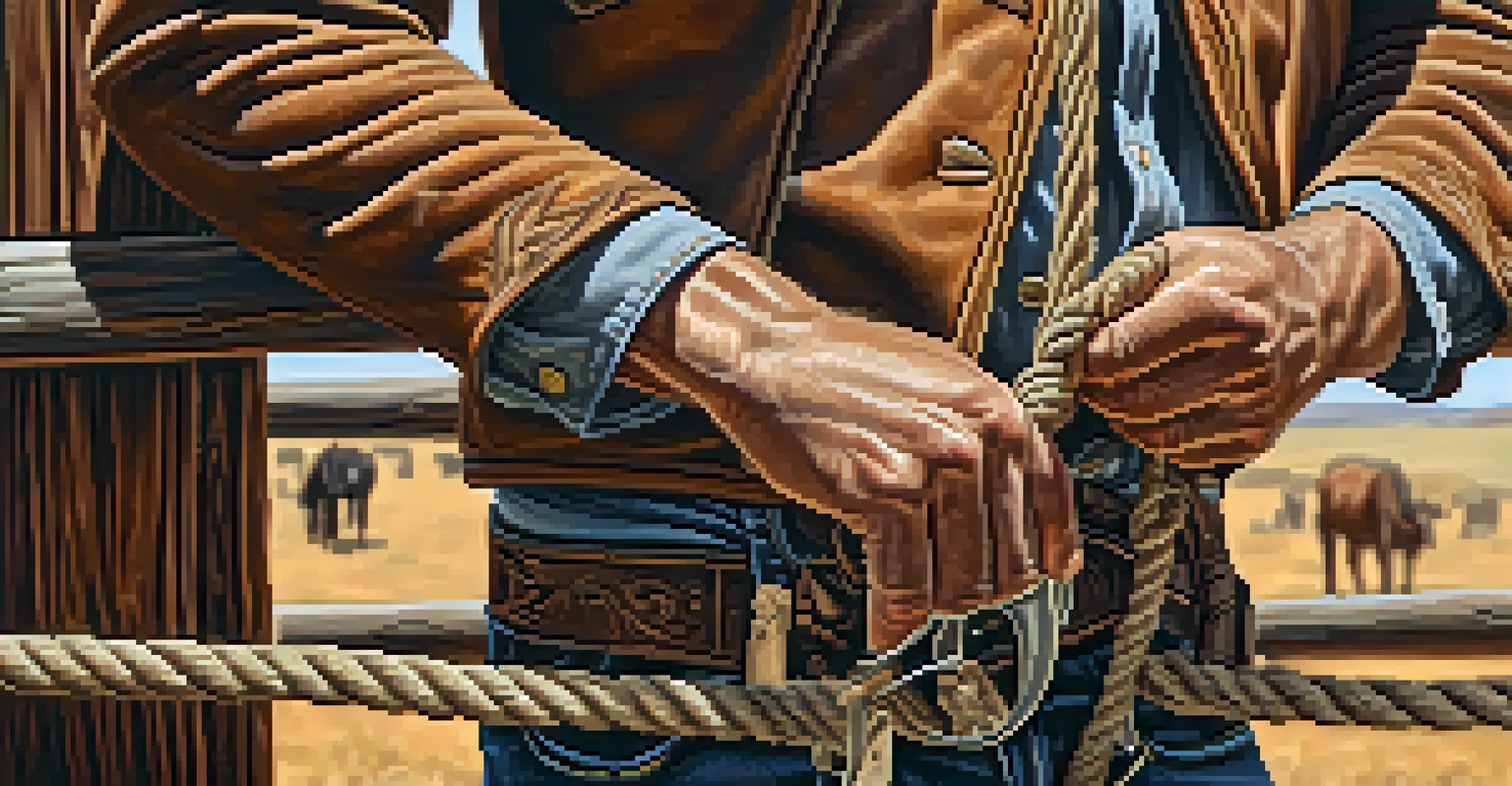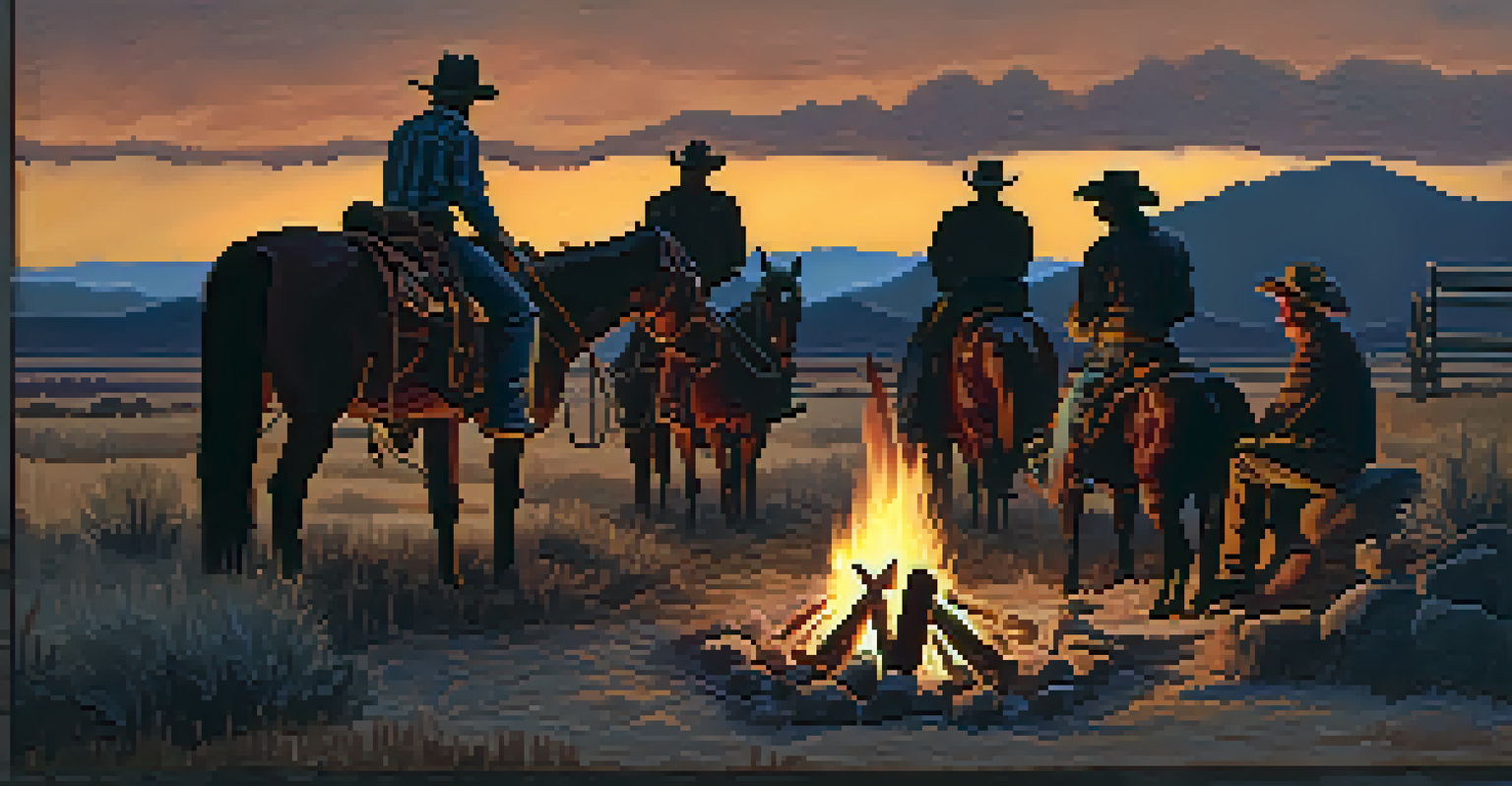Life as a Cowboy: The Realities of the Western Lifestyle

The Cowboy's Daily Routine: From Dawn Till Dusk
A typical day for a cowboy starts early, often before the sun peeks over the horizon. Mornings are filled with chores, whether it’s feeding livestock or preparing for a day of riding. As the sun rises, the real work begins, which might include checking fences, herding cattle, or managing ranch tasks.
A cowboy is a man who is the same inside and out, who is able to handle the ups and downs of life with skill and grace.
The rhythm of a cowboy's day is dictated by nature and the needs of the ranch. Unlike office workers, there are no rigid hours; the work continues until the tasks are completed. This lifestyle can be demanding, but it also offers a unique freedom and connection to the land.
In the quiet moments between tasks, cowboys often find camaraderie with their fellow ranch hands. Sharing stories around a campfire or during a break helps to build strong bonds, making the hard work feel a little lighter.
The Essential Skills Every Cowboy Must Master
Being a cowboy isn't just about riding horses; it's an intricate blend of skills and knowledge. From roping and riding to understanding cattle behavior, each task requires practice and dedication. Mastering these skills takes time and often involves learning from experienced hands.

Navigating the unpredictable elements of nature is another crucial aspect of cowboy life. Weather can change rapidly, requiring cowboys to be prepared for anything, whether it's a sudden storm or a scorching heatwave. This adaptability is vital to ensure the safety of the cattle and the ranch.
Daily Life of a Cowboy
A cowboy's daily routine is shaped by nature, requiring them to adapt and connect deeply with their land and livestock.
Moreover, a good cowboy must possess strong problem-solving skills to tackle unforeseen challenges, whether it’s fixing a broken fence or dealing with a sick animal. This combination of physical and mental agility is what truly defines the cowboy lifestyle.
The Gear That Makes a Cowboy: Tools of the Trade
A cowboy's gear is integral to their daily life and work, often reflecting both practicality and personal style. Boots, hats, and spurs are more than just accessories; they are essential for safety and efficiency while working with livestock. Each item has a purpose, from protecting against the elements to providing grip in the saddle.
The cowboy's life is a life of freedom, but it is also a life of hard work and responsibility.
Ropes are another critical tool of the trade, with lariats being used for everything from catching cattle to securing loads. The art of roping is a skill developed over time, showcasing the cowboy’s precision and expertise. This connection to their tools emphasizes the cowboy’s deep-rooted relationship with their craft.
Maintaining this gear is part of the job, requiring regular cleaning and repairs to ensure everything functions properly. This upkeep speaks to the cowboy’s respect for their equipment, which ultimately translates into their ability to perform their duties effectively.
Facing the Elements: Weather and Its Impact on Cowboy Life
Living and working outdoors means that cowboys must be prepared for all types of weather. From blistering heat in the summer to biting cold in the winter, each season presents unique challenges. Weather can dictate the day’s tasks, making flexibility a key trait for every cowboy.
Rain can turn a dry, dusty trail into a muddy mess, complicating even the simplest of tasks. Conversely, extreme heat can lead to dehydration and exhaustion, making regular breaks essential. Understanding the weather patterns is crucial for both safety and productivity.
Essential Cowboy Skills
Mastering a variety of skills, from roping to weather navigation, is crucial for cowboys to thrive in their demanding roles.
Despite these challenges, many cowboys find beauty in the changing seasons. Each day brings new sights and experiences, from breathtaking sunrises to the peacefulness of a snowy landscape, reminding them of the wild beauty of the West.
The Importance of Community: Bonds Among Cowhands
The cowboy lifestyle is often associated with rugged individualism, but the reality is that community plays a crucial role. Cowhands rely on each other, forming tight-knit groups that share the workload and support one another. This sense of camaraderie can be a source of strength during tough times.
Ranching events, such as round-ups and branding, bring the community together, fostering friendships and shared experiences. These gatherings not only serve practical purposes but also create lasting memories and traditions. The laughter and stories exchanged strengthen the bond among cowboys.
Moreover, in times of crisis, whether it’s a harsh winter or a personal hardship, the community steps up to help. This support network is a testament to the values of trust and loyalty that define the cowboy way of life.
Modern Challenges: The Evolving Role of the Cowboy
While the image of the cowboy often evokes a romanticized past, the reality today includes several modern challenges. Issues like land use regulations, climate change, and economic pressures can complicate traditional ranching practices. Cowboys must adapt and innovate to navigate these complexities.
Technology has also made its way into the cowboy lifestyle, with advancements in equipment and tracking systems changing how cowboys work. While some may see this as a departure from tradition, many embrace these tools to enhance efficiency and animal welfare.
Community in Cowboy Culture
Despite the rugged individualism often associated with cowboys, community support and camaraderie play a vital role in their lives.
Despite these changes, the core values of hard work, resilience, and respect for the land remain unchanged. Modern cowboys continue to uphold these principles while finding new ways to thrive in an ever-evolving environment.
Preserving the Legacy: Cowboy Culture Today
Cowboy culture is rich and vibrant, rooted in history yet continually evolving. Events like rodeos and ranching festivals celebrate this heritage, showcasing skills that have been passed down through generations. These gatherings help to keep the cowboy spirit alive in modern society.
Furthermore, the stories of cowboys are shared through literature, music, and film, perpetuating the allure of the Western lifestyle. These narratives play a crucial role in shaping public perception and appreciation for the cowboy way of life, even beyond rural communities.

As society changes, so too does the cowboy culture, blending old traditions with new influences. This adaptability ensures that the legacy of cowboys will endure, inspiring future generations to embrace the values and lifestyle of the West.